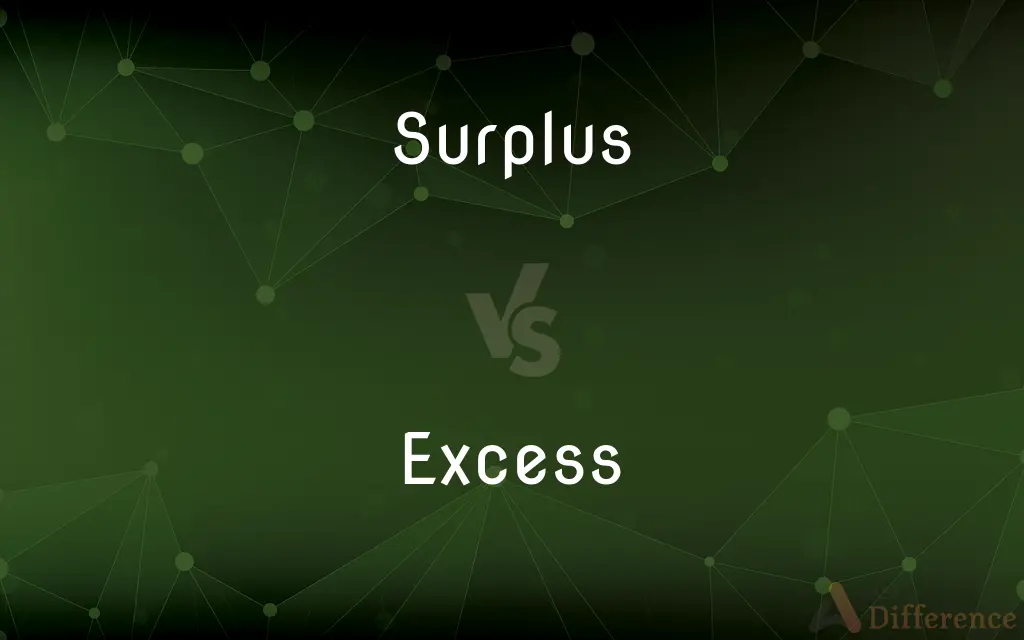Surplus vs. Excess — What's the Difference?
Edited by Tayyaba Rehman — By Fiza Rafique — Updated on October 26, 2023
Surplus is a amount beyond what's needed or used. Excess is a amount exceeding the norm or limit.

Difference Between Surplus and Excess
Table of Contents
ADVERTISEMENT
Key Differences
Surplus and Excess both refer to amounts that go beyond a certain limit or requirement. However, their connotations and applications can differ. Surplus often implies an extra amount, especially in economic or resource contexts. For instance, when discussing budgets or inventories, a surplus indicates a positive difference between assets and liabilities or between supply and demand.
Excess, on the other hand, usually suggests an overabundance, often to a degree that's deemed unnecessary or detrimental. It emphasizes crossing a threshold, sometimes with negative implications. For instance, Excess might pertain to wastage, luxury, or indulgence. When one consumes in Excess, it usually implies overindulgence.
Furthermore, Surplus is often used in financial and economic contexts to describe situations where revenues exceed expenditures or where supply surpasses demand. In such scenarios, having a Surplus is generally viewed as positive, signifying efficient management or prosperous conditions. On the contrary, Excess might be used in a wider range of contexts, from health (Excess sugar) to behaviors (Excess spending).
Another distinction lies in their nuances. While Surplus tends to have a neutral or positive connotation, indicating a beneficial overflow, Excess might carry a negative implication, pointing to wastage or unnecessary abundance. It's also worth noting that while both terms highlight quantities that go beyond a certain standard, their standards might differ. Surplus contrasts with necessity or use, while Excess contrasts with norm or limit.
In summary, while both Surplus and Excess denote amounts beyond a certain standard, Surplus often emphasizes a beneficial overflow, especially in economic contexts, while Excess underscores overabundance, often with a negative connotation.
ADVERTISEMENT
Comparison Chart
Primary Connotation
Beneficial overflow
Overabundance
Common Contexts
Economic, financial
Health, behavior
Implication
Positive or neutral
Often negative
Contrast Standard
Necessity or use
Norm or limit
Example Contexts
Budgets, inventories
Consumption, indulgence
Compare with Definitions
Surplus
Exceeding the minimum requirement.
The fundraiser generated a Surplus of funds for the project.
Excess
More than what is needed, desired, or required.
The warehouse had Excess stock of electronics.
Surplus
Extra supply over demand in the market.
The agricultural Surplus was exported to neighboring countries.
Excess
Overindulgence in an activity or consumption.
Excess spending led to his financial woes.
Surplus
A beneficial excess in resources or goods.
Due to efficient farming, there was a Surplus of crops.
Excess
The amount by which one quantity surpasses another.
He ate to Excess during the holidays.
Surplus
An amount that remains when use or need is satisfied.
The store had a Surplus of winter jackets.
Excess
A surplus amount over a particular limit.
The Excess baggage incurred an additional fee.
Surplus
An amount of something left over when requirements have been met; an excess of production or supply
Exports of food surpluses
Excess
The state of exceeding what is normal or sufficient
Rains that filled the reservoirs to excess.
Surplus
More than what is needed or used; excess
Make the most of your surplus cash
The firm told 284 employees that they were surplus to requirements
Excess
An amount or quantity beyond what is normal or sufficient; a surplus
Sold most of the stoves and put the excess in the warehouse.
Surplus
Being more than or in excess of what is needed or required
Surplus grain.
Excess
The amount or degree by which one quantity exceeds another
Profit is the excess of sales over costs.
Surplus
An amount or quantity in excess of what is needed.
Excess
Intemperance; overindulgence
Drank to excess.
Surplus
Total assets minus the sum of all liabilities.
Excess
A behavior or action that exceeds proper or lawful bounds
Tried to avoid financial excesses such as buying expensive clothes.
Surplus
Excess of a corporation's net assets over the face value of its capital stock.
Excess
Being more than is usual, required, or permitted
Skimming off the excess fat.
Surplus
Excess of receipts over expenditures.
Excess
To eliminate the job or position of
Teachers who were excessed during the downturn.
Surplus
That which remains when use or need is satisfied, or when a limit is reached; excess; overplus.
Excess
The state of surpassing or going beyond a limit; the state of being beyond sufficiency, necessity, or duty; more than what is usual or proper.
The excess of heavy water was given away to the neighbouring country.
Surplus
Specifically, an amount in the public treasury at any time greater than is required for the ordinary purposes of the government.
Excess
The degree or amount by which one thing or number exceeds another; remainder.
The difference between two numbers is the excess of one over the other.
Surplus
(legal) The remainder of a fund appropriated for a particular purpose.
Excess
An act of eating or drinking more than enough.
Surplus
(legal) assets left after liabilities and debts, including capital stock have been deducted.
Excess
(geometry) Spherical excess, the amount by which the sum of the three angles of a spherical triangle exceeds two right angles. The spherical excess is proportional to the area of the triangle.
Surplus
Being or constituting a surplus; more than sufficient.
Surplus population
Surplus words
The latest shipment of goods is surplus to our needs.
Excess
A condition on an insurance policy by which the insured pays for a part of the claim.
Surplus
(transitive) To treat as surplus to requirements; to sell off or dismiss from employment, etc.
Excess
More than is normal, necessary or specified.
Surplus
That which remains when use or need is satisfied, or when a limit is reached; excess; overplus.
Excess
To declare (an employee) surplus to requirements, such that he or she might not be given work.
Surplus
Specifically, an amount in the public treasury at any time greater than is required for the ordinary purposes of the government.
Excess
The state of surpassing or going beyond limits; the being of a measure beyond sufficiency, necessity, or duty; that which exceeds what is usual or proper; immoderateness; superfluity; superabundance; extravagance; as, an excess of provisions or of light.
To gild refined gold, to paint the lily,To throw a perfume on the violet, . . . Is wasteful and ridiculous excess.
That kills me with excess of grief, this with excess of joy.
Surplus
Being or constituting a surplus; more than sufficient; as, surplus revenues; surplus population; surplus words.
When the price of corn falleth, men give over surplus tillage, and break no more ground.
Excess
An undue indulgence of the appetite; transgression of proper moderation in natural gratifications; intemperance; dissipation.
Be not drunk with wine, wherein is excess.
Thy desire . . . leads to no excessThat reaches blame.
Surplus
A quantity much larger than is needed
Excess
The degree or amount by which one thing or number exceeds another; remainder; as, the difference between two numbers is the excess of one over the other.
Surplus
More than is needed, desired, or required;
Trying to lose excess weight
Found some extra change lying on the dresser
Yet another book on heraldry might be thought redundant
Skills made redundant by technological advance
Sleeping in the spare room
Supernumerary ornamentation
It was supererogatory of her to gloat
Delete superfluous (or unnecessary) words
Extra ribs as well as other supernumerary internal parts
Surplus cheese distributed to the needy
Excess
A quantity much larger than is needed
Surplus
A positive balance after deducting liabilities.
The company's financial report showed a Surplus.
Excess
Immoderation as a consequence of going beyond sufficient or permitted limits
Excess
The state of being more than full
Excess
Excessive indulgence;
The child was spoiled by overindulgence
Excess
More than is needed, desired, or required;
Trying to lose excess weight
Found some extra change lying on the dresser
Yet another book on heraldry might be thought redundant
Skills made redundant by technological advance
Sleeping in the spare room
Supernumerary ornamentation
It was supererogatory of her to gloat
Delete superfluous (or unnecessary) words
Extra ribs as well as other supernumerary internal parts
Surplus cheese distributed to the needy
Excess
Going beyond what is regarded as usual or proper.
Excess sugar in the diet can be harmful.
Common Curiosities
Does Excess imply wastage?
Excess can imply wastage or overabundance, often exceeding what's necessary or proper.
How does Surplus relate to demand and supply?
Surplus can refer to the situation where supply surpasses demand.
Can Excess be beneficial?
While it typically implies overabundance, in some contexts, it might be seen as beneficial.
Is Surplus always a positive term?
Often, but not always. While Surplus usually denotes a beneficial overflow, context matters.
Does a Surplus always imply efficiency?
Not necessarily, but it can indicate efficient management or favorable conditions.
Is Excess limited to tangible goods?
No, it can refer to intangible aspects like emotions or behaviors.
Is Excess always a negative term?
Not always, but it often carries a negative connotation of overabundance.
Can Excess refer to behaviors?
Yes, it can describe overindulgence in actions, like Excess drinking or spending.
Can Surplus refer to money?
Yes, it can indicate when revenues exceed expenditures.
Can Surplus apply to non-economic situations?
Yes, it can denote any situation where there's an amount beyond what's needed or used.
Share Your Discovery

Previous Comparison
Determinant vs. Article
Next Comparison
Deny vs. RejectAuthor Spotlight
Written by
Fiza RafiqueFiza Rafique is a skilled content writer at AskDifference.com, where she meticulously refines and enhances written pieces. Drawing from her vast editorial expertise, Fiza ensures clarity, accuracy, and precision in every article. Passionate about language, she continually seeks to elevate the quality of content for readers worldwide.
Edited by
Tayyaba RehmanTayyaba Rehman is a distinguished writer, currently serving as a primary contributor to askdifference.com. As a researcher in semantics and etymology, Tayyaba's passion for the complexity of languages and their distinctions has found a perfect home on the platform. Tayyaba delves into the intricacies of language, distinguishing between commonly confused words and phrases, thereby providing clarity for readers worldwide.
















































